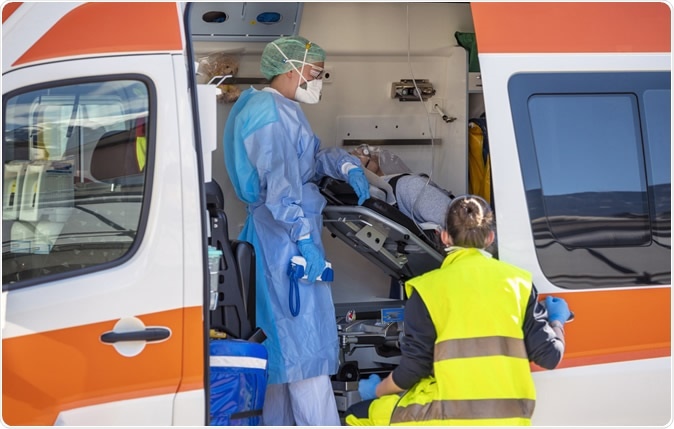This new study by researchers at the Società Italiana di Anesthesia Analgesia Rianimazione e Terapia Intensiva (SIAARTI) Airway Research Group, and The European Airway Management Society has provided data on recommendations from clinical practice from the country’s own experience being one of the most shaken countries affected by COVID-19.

Covid-19. Italian paramedics with protective masks assist a man with Coronavirus Image Credit: faboi / Shutterstock
The novel coronavirus, which first emerged in a seafood market in Wuhan City, Hubei Province in China, has led to a global pandemic, affecting 180 countries and territories and infecting nearly a million people worldwide. In Italy, the number of cases skyrocketed over the past month, and its healthcare system is buckling under the pressure from a massive influx of patients.
In the clinical data gathered from Italian hospitals in the peak of the pandemic, the experiences and recommendations from clinical practice are essential areas to tackle. The new study reported the impact of COVID-19 on regional and national healthcare infrastructure. Included in the study are recommendations based on the experiences of doctors, nurses, and healthcare personnel in managing patients in the country.
The team highlighted the key elements needed in the clinical management of the viral infection, including safe oxygen therapy, airway management, personal protective equipment, and non-technical aspects of patient care.
Available evidence
While it is true that the implementation of measures to protect the health of the citizens and the therapies applied in the healthcare setting should be guided by evidence-based recommendations approved by the scientific community, there is limited evidence currently available amid the COVID-19 health crisis. Gathering all available data on therapies and clinical practices is crucial to develop what is needed now, an effective way to help people survive.
The researchers noted that through planning, training, and teamwork, health workers and health care systems might be able to deal with the new pandemic. In most cases, clinicians rely on previous therapies and treatments that were performed on similar cases, like that of the SARS and MERS outbreaks.
What Italy is doing
The Italian government imposed an unprecedented lockdown three weeks ago to curb the spread of the coronavirus. During that time, the country has reported about 6,000 confirmed cases. Though many health experts deemed the action as “too late,” the country is now reporting fewer infections.

ROME, ITALY - 12 March 2020: A Police stands alone in front of the Spanish Steps in Rome, Italy. Confinement measures are enforced following the coronavirus pandemic emergency. Image Credit: Em Campos / Shutterstock
Today, the country has reported more 115,242 cases and 13,915 deaths. The government has decided to extend the lockdown until mid-April, and some stores and restaurants may be able to open by late May.
The country would not return to its normal activities for a while, at least not until they are sure the outbreak has been eradicated to prevent a second wave of cases. The goal of the government is to reduce the burden on the healthcare system by flattening the curve and prevent further infections.
Italy’s daily death toll from COVID-19 was the lowest for six days, health officials said. However, the overall number of new infections increased. About 727 people died from coronavirus over the last 24 hours, down from 837 the previous day. Italy accounts for approximately 30 percent of all global deaths, and authorities fear the number could be higher.
The country has now reported more than 18,000 recoveries. The global number of confirmed cases nears a million, with more than 47,000 deaths and nearly 200,000 recoveries.
Across the globe, the numbers are continuously increasing. The total number of confirmed cases has surpassed one million, and the death toll has reached 52,973. The number of recoveries has also increased to 210,335, the majority of whom were from China.
Sources:
Journal reference: